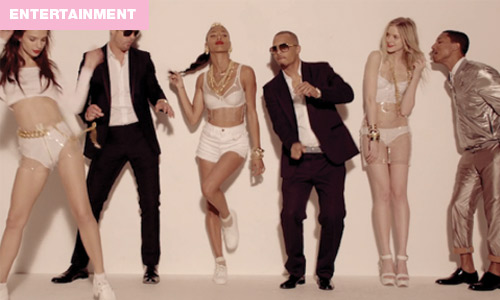Over 200 Musicians Defend ‘Blurred Lines’ Over Copyright Case

Over 200 musicians including Hans Zimmer, R. Kelly and Earth Wind & Fire, have signed an amicus brief supporting the Blurred Lines appeal.
{youtube}yyDUC1LUXSU{/youtube}
{youtube}fp7Q1OAzITM{/youtube}
Last week, Pharrell Williams, Robin Thicke, and T.I. have filed an appeal disputing the verdict that their mega hit Blurred Lines was a copyright infringement. In 2013, the trio lost the case to the Marvin Gaye estate who received $5.3 million dollars in damages and 50% royalties from Blurred Lines after the court ruling.
The trio of musicians are seeking to overturn the ruling saying, "This outcome created international press coverage and widespread expressions of concern by members of the music community that, if left to stand, the 'Blurred Lines' verdict would chill musical creativity and inhibit the process by which later artists draw inspiration from earlier artists to create new popular music,"
Over 200 musicians signed an amicus brief in support of the appeal. (An amicus is a party that is not involved in a particular litigation but that is allowed by the court to advise it on a matter of law or policy directly affecting the litigation.)
In total, 212 musicians attached their names to the brief, including John Oates (of Hall & Oates), Linkin Park, Patrick Stump (of Fall Out Boy), Tool, Hans Zimmer (film composer to the Batman trilogy), Curt Smith (of Tears for Fears), Juicy J (American rapper), the Go-Go's (80’s new wave band), Malay (Frank Ocean collaborator), Jennifer Hudson, Patrick Monahan (of Train), the production duo Stargate, Aloe Blacc (American soul singer), Jean Baptiste (Pop songwriter), Kiesza, Rivers Cuomo (of Weezer), Danger Mouse, and R. Kelly and two hundred more.
The brief lays out the concerns many artists have voiced since a Los Angeles jury determined that Blurred Lines essentially ripped off Marvin Gaye's 1977 hit Got to Give It Up. As the amicus brief notes, Lines and Give It Up have completely different melodies and song structures, and do not share any lyrics or "a sequence of even two chords played in the same order and for the same duration." Yet the court ruled that Blurred Lines significantly aped the vibe of Got to Give It Up, something that had previously been beyond copyright protection.
The brief states,
"The verdict in this case threatens to punish songwriters for creating new music that is inspired by prior works," reads the brief, which was written by attorney Ed McPherson. "All music shares inspiration from prior musical works, especially within a particular musical genre. By eliminating any meaningful standard for drawing the line between permissible inspiration and unlawful copying, the judgment is certain to stifle creativity and impede the creative process. The law should provide clearer rules so that songwriters can know when the line is crossed, or at least where the line is."
A month ago, Ed Sheeran was also hit with copyright lawsuit when Ed Townsend, co-writer of Marvin Gaye’s Let’s Get it On found their song and Sheeran’s Thinking Out Loud to sound similar.
{youtube}z1YxFjQXbXg{/youtube}
#y101fm #alwaysfirst #rhythmofthecity #entertainment
